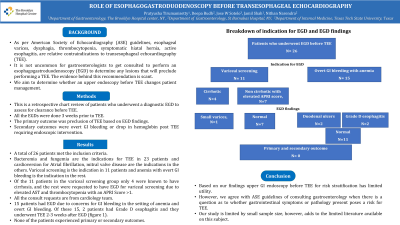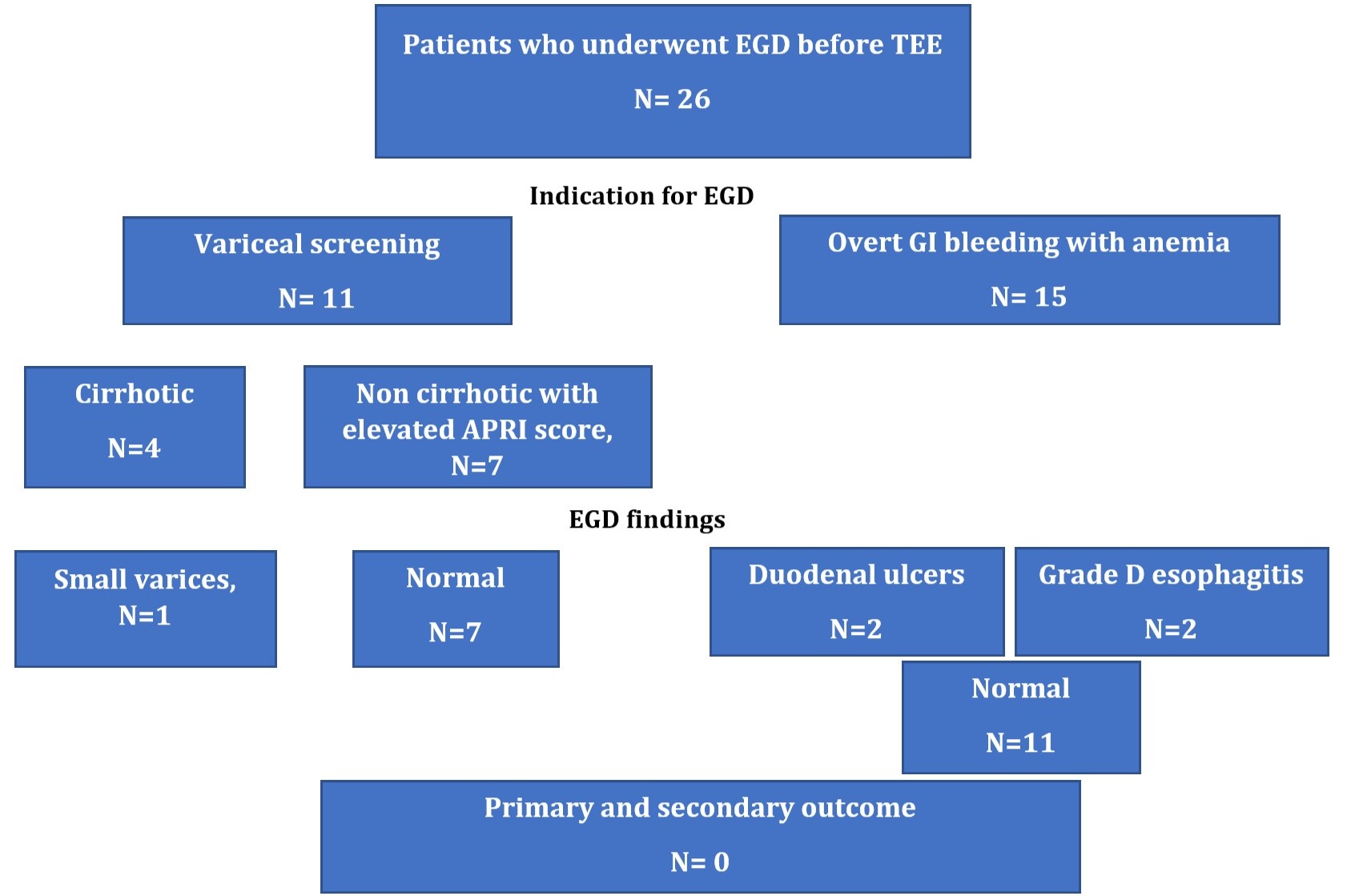Back


Poster Session B - Monday Morning
Category: General Endoscopy
B0282 - Role of Esophagogastroduodenoscopy Before Transesophageal Echocardiography
Monday, October 24, 2022
10:00 AM – 12:00 PM ET
Location: Crown Ballroom

Has Audio
- PT
Pratyusha Tirumanisetty, MD
The Brooklyn Hospital Center
Brooklyn, NY
Presenting Author(s)
Pratyusha Tirumanisetty, MD1, Deepa Budh, MD2, Jose W. Sotelo, MD3, Jamil Shah, MD1, Nithan Narendra, MD2
1The Brooklyn Hospital Center, Brooklyn, NY; 2St. Barnabas Hospital, Bronx, NY; 3Texas Tech University Health Sciences Center, El Paso, TX
Introduction: As per American Society of Echocardiography (ASE) guidelines, esophageal varices, dysphagia, thrombocytopenia, symptomatic hiatal hernia, active esophagitis, are relative contraindications to transesophageal echocardiography (TEE). It is not uncommon for gastroenterologists to get consulted to perform an esophagogastroduodenoscopy (EGD) to determine any lesions that will preclude performing a TEE. The evidence behind this recommendation is scant. We aim to determine whether an upper endoscopy before TEE changes patient management.
Methods: This is a retrospective chart review of patients who underwent a diagnostic EGD to assess for clearance before TEE. All the EGDs were done 3 weeks prior to TEE. The primary outcome was preclusion of TEE based on EGD findings. Secondary outcomes were overt GI bleeding or drop in hemoglobin post TEE requiring endoscopic intervention.
Results: A total of 26 patients met the inclusion criteria. Bacteremia and fungemia are the indications for TEE in 23 patients and cardioversion for Atrial fibrillation, mitral valve disease are the indications in the others. Variceal screening is the indication in 11 patients and anemia with overt GI bleeding is the indication in the rest. Of the 11 patients in the variceal screening group only 4 were known to have cirrhosis, and the rest were requested to have EGD for variceal screening due to elevated AST and thrombocytopenia with an APRI Score >1. All the consult requests are from cardiology team. 15 patients had EGD due to concerns for GI bleeding in the setting of anemia and overt GI bleeding. Of these 15, 2 patients had Grade D esophagitis and they underwent TEE 2-3 weeks after EGD (figure 1). None of the patients experienced primary or secondary outcomes.
Discussion: Based on our findings upper GI endoscopy before TEE for risk stratification has limited utility. However, we agree with ASE guidelines of consulting gastroenterology when there is a question as to whether gastrointestinal symptoms or pathology present poses a risk for TEE. Our study is limited by small sample size, however, adds to the limited literature available on this subject.

Disclosures:
Pratyusha Tirumanisetty, MD1, Deepa Budh, MD2, Jose W. Sotelo, MD3, Jamil Shah, MD1, Nithan Narendra, MD2. B0282 - Role of Esophagogastroduodenoscopy Before Transesophageal Echocardiography, ACG 2022 Annual Scientific Meeting Abstracts. Charlotte, NC: American College of Gastroenterology.
1The Brooklyn Hospital Center, Brooklyn, NY; 2St. Barnabas Hospital, Bronx, NY; 3Texas Tech University Health Sciences Center, El Paso, TX
Introduction: As per American Society of Echocardiography (ASE) guidelines, esophageal varices, dysphagia, thrombocytopenia, symptomatic hiatal hernia, active esophagitis, are relative contraindications to transesophageal echocardiography (TEE). It is not uncommon for gastroenterologists to get consulted to perform an esophagogastroduodenoscopy (EGD) to determine any lesions that will preclude performing a TEE. The evidence behind this recommendation is scant. We aim to determine whether an upper endoscopy before TEE changes patient management.
Methods: This is a retrospective chart review of patients who underwent a diagnostic EGD to assess for clearance before TEE. All the EGDs were done 3 weeks prior to TEE. The primary outcome was preclusion of TEE based on EGD findings. Secondary outcomes were overt GI bleeding or drop in hemoglobin post TEE requiring endoscopic intervention.
Results: A total of 26 patients met the inclusion criteria. Bacteremia and fungemia are the indications for TEE in 23 patients and cardioversion for Atrial fibrillation, mitral valve disease are the indications in the others. Variceal screening is the indication in 11 patients and anemia with overt GI bleeding is the indication in the rest. Of the 11 patients in the variceal screening group only 4 were known to have cirrhosis, and the rest were requested to have EGD for variceal screening due to elevated AST and thrombocytopenia with an APRI Score >1. All the consult requests are from cardiology team. 15 patients had EGD due to concerns for GI bleeding in the setting of anemia and overt GI bleeding. Of these 15, 2 patients had Grade D esophagitis and they underwent TEE 2-3 weeks after EGD (figure 1). None of the patients experienced primary or secondary outcomes.
Discussion: Based on our findings upper GI endoscopy before TEE for risk stratification has limited utility. However, we agree with ASE guidelines of consulting gastroenterology when there is a question as to whether gastrointestinal symptoms or pathology present poses a risk for TEE. Our study is limited by small sample size, however, adds to the limited literature available on this subject.

Figure: Breakdown of indication for EGD and EGD findings
Disclosures:
Pratyusha Tirumanisetty indicated no relevant financial relationships.
Deepa Budh indicated no relevant financial relationships.
Jose Sotelo indicated no relevant financial relationships.
Jamil Shah indicated no relevant financial relationships.
Nithan Narendra indicated no relevant financial relationships.
Pratyusha Tirumanisetty, MD1, Deepa Budh, MD2, Jose W. Sotelo, MD3, Jamil Shah, MD1, Nithan Narendra, MD2. B0282 - Role of Esophagogastroduodenoscopy Before Transesophageal Echocardiography, ACG 2022 Annual Scientific Meeting Abstracts. Charlotte, NC: American College of Gastroenterology.
